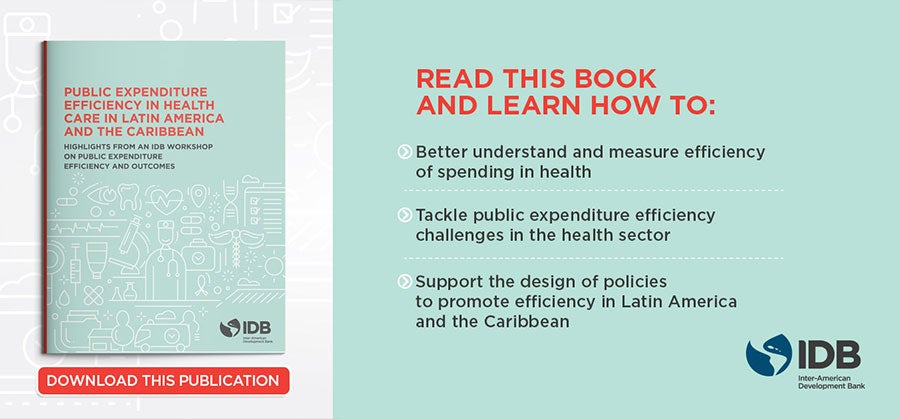Latin America and the Caribbean have experienced important improvements in key health indicators over the last two decades. For example, since 2000 average life expectancy rose from 71 to 75 years of age, and mortality rates for children under five fell by 44%. The region currently faces the challenge of maintaining these achievements and making further progress in health outcomes and equity through sustainable investments in the health sector.
Why do We Need to Prioritize Efficiency of Public Health Spending?
Population ageing, the epidemiological shift towards non-communicable diseases, the implementation of universal health coverage and the adoption of new technologies, are increasing the demand for health services, posing large pressures on public spending. Yet current deteriorating fiscal balances and poor growth perspectives predict budgetary restrictions going forward.
Therefore, countries will need to draw their attention to smarter options to use the available resources, rather than cutting budgets blindly and jeopardizing public services. Now more than ever, improving efficiency of public health spending, understood as attaining the maximum benefits out of available resources, must be prioritized.
How can the Region Improve Efficiency of Public Health Spending?
With the aim of guiding the agenda towards this goal, the Inter-American Development Bank organized a workshop for leading experts in fiscal management and healthcare to discuss how to conceptualize and measure efficiency, where the challenges and opportunities for improvement are, and which policy options can tackle inefficiencies in the health sector.
Here are the 10 key take-aways:
1. Obtaining more clarity on understanding and measuring efficiency of spending is a first step towards building effective strategies and roadmaps to address the main sources of inefficiency.
2. Further efforts are required to collect data on efficiency performance as well as related health care system characteristics in order to design context-specific policies.
3. Good governance is central to cost-effective policy choices. Shortfalls in the political and government systems can jeopardize the promotion of evidence-based solutions. For example, this has been one of the difficulties in adopting strategies to reduce tobacco consumption, even though their health impact is well known.
4. No one size fits all in measuring efficiency at the hospital level. There are different approaches (e.g. comparative benchmarking analysis, data envelope analysis, internal cost analysis). The final choice depends on the purpose of the analysis, the intended audience, and the policy issue.
5. Three out of ten leading sources of inefficiency in the health sector are related to pharmaceuticals. Promoting greater transparency and accountability in drug pricing and procurement mechanisms is an element of good governance and can result in efficiency spillovers.
6. The optimal pharmaceutical procurement policy should include both demand- and supply-side interventions, with different mechanisms for purchasing in-patent and off-patent drugs.
7. Analysts should avoid recommending a laundry list of standard solutions. Solutions need to better take evidence and context into account.
8. Policy reforms to promote efficiency can be grouped in four main categories: resource allocation decisions, incentives, managerial reforms, and enhancement of transparency and accountability. The real challenge lies in strategically choosing which reforms should be a priority.
9. Latin American and Caribbean countries should focus more on health services management. A clear understanding of structure and absorptive capacity at the various levels of care, as well as their formal and informal linkages, is key to design efficient health care networks.
10. Results-based budgeting (RBB) may be a promising tool that can lead to better efficiency and effectiveness of spending. Further evidence of the success of its application to the health sector in the region should be generated.
These messages offer a good starting point for future discussions to support the design of better policies that promote public health spending efficiency in Latin America and the Caribbean. The next steps include strengthening the analytical basis, bringing together fiscal and health sectors and sharing country experiences. We need to continue fostering discussion-prone environments to spark the development of sustainable policies that promote efficiency in our region, for the sake of our health.
Want to learn more? Download this complete summary, Public Expenditure Efficiency and Outcomes: Application to Health, Challenges and Opportunities for Improvements in Latin America and the Caribbean.
How does your country manage health spending? What lessons and opportunities do you see for improving efficiency? Tell us in the comments section or mention @BIDgente on Twitter.
Diana Pinto is Health Lead Specialist at the Social Protection and Health Division of the Inter-American Development Bank.
Gianluca Cafagna is an Associate Professional Officer at the Social Protection and Health Division of the Inter-American Development Bank.
Laura Giles Álvarez is a young professional at the Inter-American Development Bank.



Leave a Reply